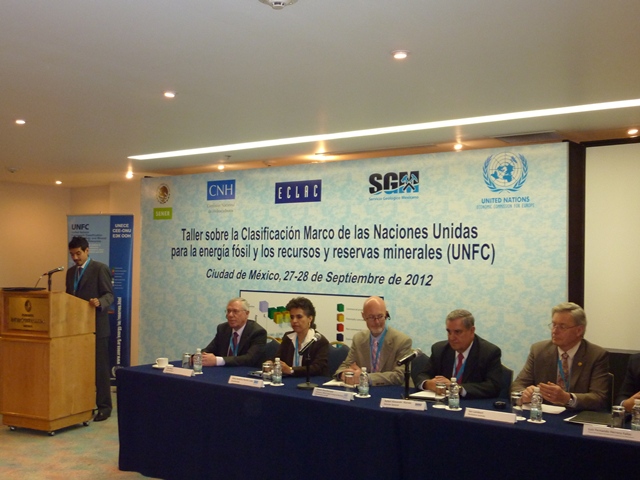
The United Nations Framework Classification for Fossil Energy and Mineral Reserves and Resources 2009 (UNFC) will help Mexico to better understand its total resource base, which in turn will facilitate achievement of its long-term national energy strategy. This statement was made by Mr. Mario Gabriel Budebo, Deputy Minister of Energy of Mexico, when opening a workshop on the UNFC in Mexico City on 27 September.
The workshop gathered more than 80 representatives from the Ministry of Energy of Mexico (SENER), the Ministry of Economy, Petróleos Mexicanos (PEMEX), Instituto Mexicano del Petróleo, the National Hydrocarbons Commission (CNH), the Mexican Geological Survey (SGM), BP México and Halliburton México. It was organized by SENER, CNH and SGM in cooperation with UNECE and the United Nations Economic Commission for Latin America and the Caribbean (ECLAC).
Mr. Juan Carlos Zepeda Molina, CNH President, stated “Mexico is one of the most important countries in terms of its historic mineral and hydrocarbons production, and this workshop on the UNFC is the first time that engineers from the mineral and hydrocarbons sector have sat down in the same room to discuss issues regarding evaluating and reporting of reserves and resources. This event is a unique experience to understand the challenges faced by both sectors (minerals and hydrocarbons) when classifying, evaluating and reporting reserves and resources. The UNFC represents a great opportunity for the country to gain a better understanding of its own reserves and resources.”
The event also served to strengthen the cooperation between UNECE and ECLAC on the UNFC. Mr. Víctor Hugo Ventura, Chief, Energy and Natural Resources Unit, ECLAC Mexico Office, observed that the UNFC is a consistent methodology that allows countries to quantify their mineral and fossil energy resources and reserves, which is essential to analyze scenarios and strategies for the sustainable development of the mining and energy industries. Mr. Ventura affirmed “Considering the importance of both the mining and fossil energy industries in Latin America, dissemination of the UNFC and discussion on its benefits is important for the region” ECLAC will work with UNECE to facilitate distribution of information on the UNFC in Latin America.
A number of presenters noted that development of the Framework Classification is not yet finished, as the specifications remain to be finalized and those need to be at hand for the system to be complete. Specifications are the secondary rules necessary to ensure an appropriate level of consistency in application of the UNFC. A draft set of specifications will be issued by UNECE for public comment in early October. CNH, SGM and PEMEX undertook to work together to review the draft specification documents and submit comments.
The value of undertaking a pilot study on the UNFC, such as that recently carried out by the Norwegian Petroleum Directorate, was emphasized by the Chair of the Expert Group on Resource Classification, Mr. David MacDonald (Vice President, Segment Reserves, BP Exploration). Mr. MacDonald noted “The benefits of the UNFC become apparent when undertaking a pilot study using the full capability of the system. Governments can identify and overcome the barriers to developing a long-term energy strategy. Industry can build development plans for progressing volumes in an efficient manner based on the project feasibility economic maturity. Investors can gain new insight into the current value and potential of different companies using a comprehensive and consistent measure.”
In closing the Workshop, Dr. Rafael Alexandri Rionda, SGM General Director, observed that the workshop served to underline the value of the UNFC in comparing the various systems of classification and reporting of mineral resources and hydrocarbons around the world on a common basis. Dr. Alexandri stated “We understand that the UNFC is a strong code that offers simplicity, as well as being a universal template that allows valid comparisons of countries’ inventories. For the time being Mexico will continue its evaluation and reporting under international standards SPE-PRMS[1] and the CRIRSCO Template[2], for hydrocarbons and minerals respectively, but including the UNFC is another option for displaying results.” The Mexican Geological Survey indicated that it is planning to prepare a National Inventory of Mineral Resources and that it will consider using the UNFC to harmonize the reserves and resources data.
For more information on the UNFC or the Expert Group on Resource Classification, visit: http://unece.org/energy/se/reserves.html and/or contact Ms. Charlotte Griffiths at: [email protected].
Note to editors
Operating under ECOSOC Decision 2004/233, UNECE’s global work on the UNFC is carried out by the Expert Group on Resource Classification, whose key focus is the further development and global promotion and implementation of the UNFC. UNFC, which is generic, intuitive and user-friendly, is the only modern classification system in the world to address the minerals, petroleum and uranium sectors using a single set of definitions and terminology.
The UNFC is an umbrella classification system which is fully aligned with the key commodity-specific systems in place worldwide for petroleum – the Petroleum Resource Management System (PRMS) of the Society of Petroleum Engineers (SPE), the World Petroleum Petroleum Council (WPC), the American Association of Petroleum Geologists (AAPG) and the Society of Petroleum Evaluation Engineers (SPEE) – and for minerals – the Committee for Mineral Reserves International Reporting Standards (CRIRSCO) International Reporting Template.
The UNFC is designed to meet the needs of four principal stakeholders: (i) analysts of international energy and mineral resources; (ii) Governments – to manage their resources accordingly; (iii) industry – to provide data and information necessary to deploy technology, management and finance in order to serve the host countries, shareholders and stakeholders; and (iv) the financial community – to provide the information necessary to allocate capital appropriately so reducing costs. A strong code, offering simplicity without sacrificing completeness or flexibility, the UNFC paves the way for improved global communications which will aid stability and security of supplies, governed by fewer and more widely understood rules and guidelines. The efficiencies to be gained through its use are substantial.

